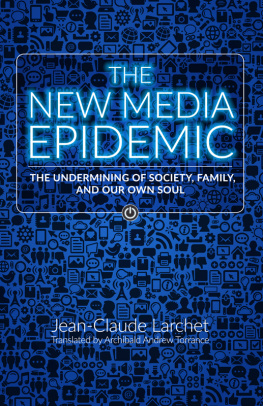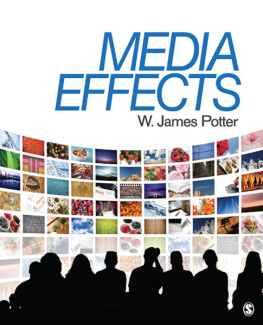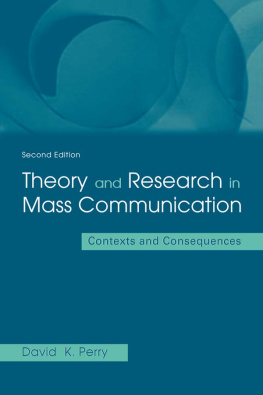The New Media Epidemic


Printed with the blessing of His Eminence,
Metropolitan Hilarion First Hierarch
of the Russian Orthodox Church Outside of Russia

The New Media Epidemic 2019 Holy Trinity Monastery

Cover Design: James Bozeman
Cover Art: Social Media Seamless Background by bubaone, 180326853m, gettyimages.com.
Originally published in French: Jean-Claude Larchet., Malade des nouveaux mdias (Paris, France: ditions du Cerf, 2016) 978-2204114868.
ISBN: 978-0-88465-471-1 (paperback)
ISBN: 978-0-88465-427-8 (ePub)
ISBN: 978-0-88465-428-5 (Mobipocket)
Library of Congress Control Number 2018961551
Quotes from THE SHALLOWS: WHAT THE INTERNET IS
DOING TO OUR BRAINS by Nicholas Carr. Copyright 2010 by
Nicholas Carr. Used by permission of W. W. Norton & Company, Inc.
New Testament Scripture passages taken from the New King James Version.
Copyright 1982 by Thomas Nelson, Inc. Used by permission.
Psalms taken from A Psalter for Prayer, trans. David James
(Jordanville, N.Y.: Holy Trinity Publications, 2011).
Old Testament and Deuterocanonical passages taken from the Orthodox Study Bible. Copyright 2008 by Thomas Nelson,
Inc. Used by permission.
All rights reserved.
Printed in the United States of America
INTRODUCTION

Addicts of Modern Media
For death has come through our windows.
Jeremiah 9:21 (NKJV)
A society, growing sicker and sicker, yet ever more powerful, has remade the reality of the world to be the backdrop for its own sickness.
Guy Debord, The society of the stage
It is very common for humans to develop things with the best of intentions and for them to have unintended, negative consequences. It is particularly important for us to talk about this now as we may be the last generation that can remember life before.
Justin Rosenstein, the inventor of the like button on Facebook
N o one today could dispute the great advantages of the new media in communication, information, and access to culture in all its forms; and soon, no one will be able to do without it. For society has incorporated them into the way its different structures work, be they social, administrative, commercial, educational, or even religious.
It is often said that their invention has given us a revolution like that of electricity and the new means of transport. But there is a profound difference between the new media and those earlier inventions that have so changed the life of modern man. No other invention has monopolized so much of our time, day to day, nor required of us such constant attention and action. Nothing else has so greatly changed our conditions and manner of working, invaded our private lives and families to such an extent, or penetrated so deeply our inner life and our subconscious. No other technique has so greatly changed our relationship to space and time, our way of viewing the world, our relationships with others, the way we see ourselves, the nature and rhythm of our work and leisure, the way we communicate, and the structure and form of our intellectual and psychological life. And no other technique, through its influence on all facets of our being, has had such an impact on our spiritual life.
A vast body of publications praises the advantages and benefits of these new media. The object of this book is not to pile on yet more fruitless praise, but to invite the reader to reflect critically on the use of these new means of communication. For such an unusual approach will reveal how they have become ever more invasive, producing many negative effects of which their users are not fully aware, although they may notice them to some extent in their own lives, in their children, and in those close to them.
Although the modern drift of society, with its dark portents for the future, might make us wish for it to change, our aim, at this critical time, is pragmatic. It is to appreciate better the directions in which the new media are leading us and the real and possible pathologies that they may provoke, to learn to master them, and to limit their use where they have regrettable effects.
The aim of this book is first to diagnose the pathologies that the media can produce and how they may develop in every sphere of societypolitical, economic, and culturaland in all facets of personal lifebodily, psychological, intellectual, and spiritual. For they may cause great harm to the lives of men and can go so far as to change mans nature itself for the worse.
If we realize how gravely sick is our civilization, we may gain strength to resist. We can gradually reduce our use of the media and so lead to a decline of the industry that profits from them. And as we reduce our use of the new media, society will change, so that we can discover once more the authentically human and spiritual communion that we have lost.
CHAPTER 1

Invasion
Invasion: the sudden and powerful penetration into a country to pillage it and master it. In medicine: the initial stage of an illness from the first symptoms to its full development. Figurative: the sudden appearance of something which takes up much space or even almost all the space.
ORTOLANG, Centre National des Ressources Textuelles et Lexicales
Definitions
A medium is a means of passing an object, a word, a sound, or an image from one state or one place to another. It is an intermediary. The term media has been used for many years to mean the main transmitters of information: the press, radio, and television. The term new media refers to more recent means of communication using the digital techniques developed with the computer. An equivalent term is digital media. Networked computers, tablets, and smartphones are the backbone of the new media, supported by digital photography, recorders, and portable players of CDs and MP3 files. Because they all use screens, one may use the term screens to describe them, which allows the television to be included. It shares many features with the new media that we will discuss later.
The word media describes both the methods of transmission and their content, for example, the Internet with its sites, blogs, forums, social networks, online games, and the like.
The singular form of the word, medium, has for many years been strongly associated with parapsychology, so here we will generally use the plural: media.
Digital Colonization
Digital media have progressively invaded every kind of activity and every part of our public and private lives. Roberto Casati has described this as digital colonialism, which he defines thus:
Digital colonialism is an ideology based on a simple principle: If you can, you must. If anything, or any activity, can become digital then it must become digital. The digital colonists spare no pains to bring new technologies into every facet of our lives, from reading to games, from teaching to decision making, from communication to planning, from the preservation of artefacts to medical diagnosis. The colonialist assumption is taken as read by the colonists. They like its simplicity: it is general, applying equally to any object or activity whatsoever.
Next page















